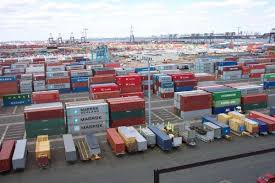Stakeholders in Nigeria’s export business have again raised serious concerns over the slow pace of cargo movement at the Tin Can Island and Apapa ports in Lagos. These delays, especially in transferring containers and the limited arrival of vessels, are affecting timely cargo evacuation and causing exporters and other players in the sector to suffer huge financial losses.
These concerns came up during a recent stakeholders’ meeting hosted by the Lilypond Export Command of the Nigeria Customs Service (NCS). The event, which was held with support from Parallex Bank, brought together both government agencies and private sector participants to discuss how to improve export procedures and reduce the many problems exporters are facing.
At the meeting, participants noted that although there have been positive developments in some areas, persistent problems with port terminals and poor coordination with shipping lines continue to negatively impact Nigeria’s efforts to improve its export system.
In spite of these challenges, many of the stakeholders gave commendation to the Lilypond Export Command. They said the Command, under the leadership of Comptroller Ajibola Odunsanya, has made meaningful progress in simplifying and fast-tracking the export process. According to them, the improvements have made things easier for existing exporters, attracted new ones into the business, and given confidence to foreign investors who want to export from Nigeria.
Comptroller Ajibola Odunsanya, who is the Customs Area Controller of the Command, appreciated the support and cooperation of all stakeholders. He said it is this partnership that has made it possible for the Command to make progress. He noted that one of the major problems faced by exporters in the past — Nigeria Export Proceeds (NXP) documentation — has now been properly handled.
“We are committed to strengthening our partnership with all actors in the export chain,” he said. “Our renewed engagement with stakeholders has yielded improvements in process efficiency and built mutual trust.”
A key moment at the event was the official unveiling of the B’Odogwu digital platform, a new innovation by the Nigeria Customs Service. This platform was introduced by Assistant Comptroller of Customs Rauf Kassim, who is the Acting Deputy Comptroller in charge of Revenue.
Kassim explained that B’Odogwu is designed to make documentation easier, faster, and more transparent for exporters. The platform includes features like electronic tracking of cargo, non-intrusive scanning, and automated risk management systems — all aimed at making Nigeria’s export process meet global best practices.
He encouraged all players in the value chain — exporters, clearing agents, shipping companies, and terminal operators — to fully embrace the platform. According to him, this will help reduce time spent on documentation and reduce human interference in the export process.
Despite the positive impact of B’Odogwu and improvements at Lilypond, stakeholders say the bigger problem lies at the ports, especially Tin Can and Apapa. They said issues such as lack of enough ships calling at the ports, delay in container movement between terminals, and congestion continue to slow down exports and cause losses. They called for better cooperation among the Nigeria Ports Authority (NPA), terminal operators, shipping companies, and customs officers.
According to them, if these issues are not urgently addressed, it may defeat the purpose of the ongoing trade facilitation and export promotion efforts by the government.
Industry players agree that while the Lilypond Export Command has done well, lasting success will only come if all arms of the export system are working together. They stressed that Nigeria must resolve its port logistics issues if it wants to compete globally and benefit from international trade.
The unveiling of the B’Odogwu platform has brought new hope, but its success will depend on full cooperation from all stakeholders. With the right support and commitment, Nigeria has the potential to become a hub for efficient export operations in Africa.
